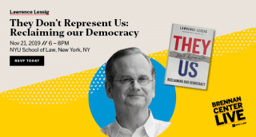They Don’t Represent Us: Reclaiming Our Democracy (book)

They Don’t Represent Us: Reclaiming Our Democracy (book)
They Don’t Represent Us: Reclaiming Our Democracy is a book written by Harvard Law School professor Lawrence Lessig. [1]
Overview
Lessig provides non-partisan analysis of the political landscape, with a special focus on issues like representative democracy, campaign finance, the electoral college, gerrymandering, and the effects of social media and cable news. [2]
The book argues that fomenting contempt towards the rich is misplaced.
Lessig asserts that while the system does benefit the rich in many ways, its fatal flaw is that there is a lack of structural framework in the government itself. It is not designed to benefit the rich, more often than not the system ends up benefitting the narrow interests of a political party. He presents political corruption as an emergent aspect of local actions and policies rather than a great conspiracy perpetrated by the wealthy. [1]
Lessig identifies campaign finance as one of the major issues weighing down political effectiveness. He said in an interview with the Harvard Gazette: [3]
"The real distortion in our political system comes through the constant influence that money has on the behavior of the representatives.
The representatives know that if you vote one way or another you’re going to either [attract] or repel substantial amounts of money to their campaigns, and so they live in this constant shadow of the influence of these funders"
Lessig also posits that social media and the internet have made it more difficult to work through polarizing issues as a nation. The dissemination of information didn't actually make the populous smarter, more well-rounded individuals. Instead, people are subject to ideological echo chambers and political discourse is becoming more tribal. [1]
Lessig suggests that there are a few immediate things that the people can tackle to create a more representative government, a short list covers:[2]
A move immediately to public campaign funding, leading to more representative candidates
A reformed Electoral College, that gives the President a reason to represent America as a whole
A federal standard to end partisan gerrymandering in the states
A radically reformed Senate
A federal penalty on states that don’t secure to their people an equal freedom to vote
Institutions that empower the people to speak in an informed and deliberative way
See Also
Chutzpah: By Alan M. Dershowitz
Steve Castor
